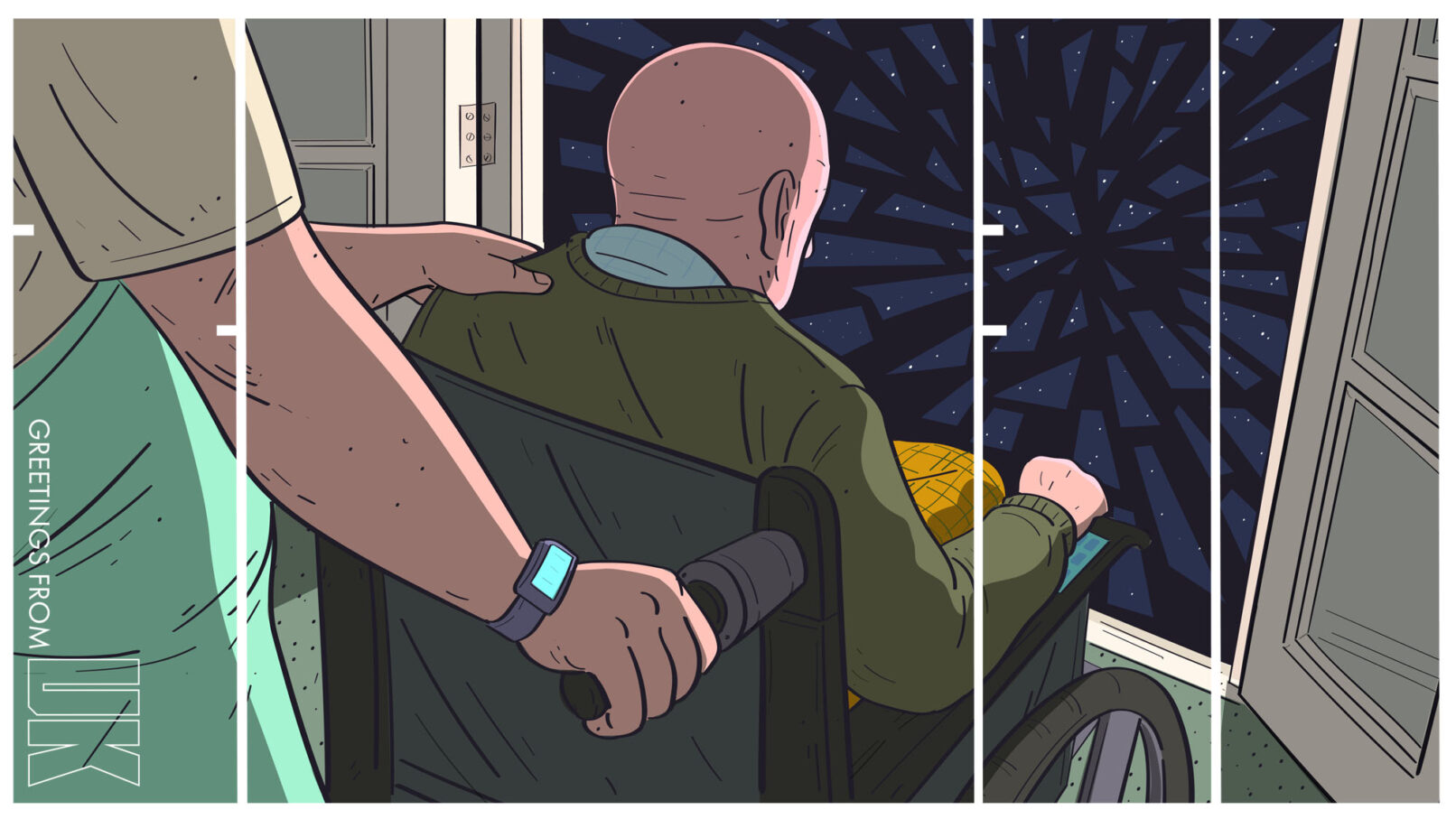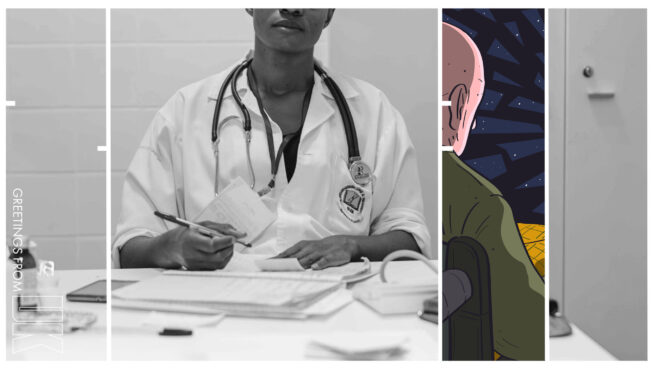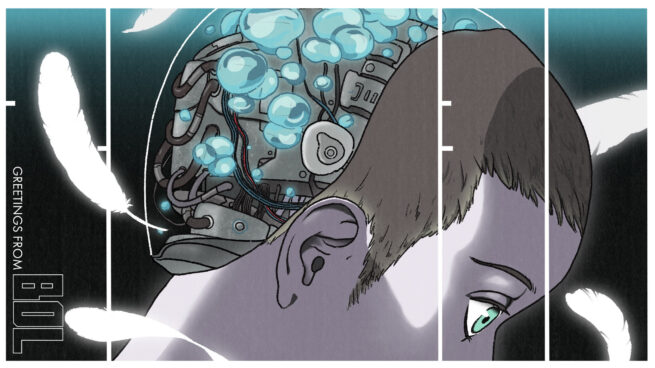You were expecting to find the Professor in the garden. The weather has finally broken after a week of dull and unrelenting rain and his small outdoor space is flooded green and gold. Instead, he sits by the window, waiting for you. He swivels at your key in the door and inclines his head. Music streams through the house like sunshine: a woman’s voice, high-pitched and fragile. An opera–surprising because the professor has rigorous taste in music, favouring the instrumental and avant-garde. He talks as often of his preferred composers (Phillip Glass, John Cage) as he does of physics.
Glass Cage
By Gita Ralleigh
You remove outdoor clothing, wave, signal that you must wash your hands. Taking a clean overall and head-wrap from the shelf, you pull on disposable gloves and fasten the plastic apron at your waist. You’re always careful with hygiene, especially when you take the Underground. Although the trains are clean, subterranean air feels murky and damp, and you’d hate to pass anything on to the Professor, whom you’re fond of. The hours suit you too; once you’re through with college, you can make it here for the late shift, 5pm to midnight. Mostly you set his infusion up straight away, but today you point at the glass doors that open onto the garden.
“Not outside, Prof? It’s a beautiful afternoon.”
He shakes his head, fumbles for the button on his chair arm to turn the music down.
“I had calls to make. Sara had to leave, so–”
“Don’t you want to go out now? The garden looks lovely.” Typical of Sara–a thin, anxious woman, who does the day shift–to leave early. She never says much, only nods in response to your greeting.
“Jorge’s done an excellent job. Yes, why not?”
Jorge is the Professor’s gardener: young, bearded and handsome who, to your regret, also comes in the morning.
You prepare the necessary equipment: syringes, needles, tubing, antiseptic, sterile dressings, and log into BioDia.
You tuck the blanket over the Professor’s fragile legs, dangling like pale roots from his gown and watch him roll his chair down the slope, wheeling to face the westerly sun.
In the kitchen, the refrigerated compartment for medication has only a single pack of infusion. You prepare the necessary equipment: syringes, needles, tubing, antiseptic, sterile dressings, and log into BioDia. Sara signed out an hour before the end of her shift, you notice. She didn’t place another order. You check the Professor’s vital signs: ECG shows a few ectopic beats, oxygen saturation normal, platelets borderline–you’ll check for bruising when you give him the infusion. Nothing else amiss. You order another crate of infusion and begin cleaning the trolley for the procedure. You don’t notice the red flashing letters at first:
REQUEST DENIED
You sigh again, retyping the order manually.
REQUEST DENIED
A swipe at the sidebar gives more information. You lean towards the screen in disbelief.
REQUEST FOR UNIXCAG2080 DENIED
…………………………PATIENT NO. IBI3487299A
TRANSFERRED TO PALLIATION
“What! Why?” There’s no point yelling at a machine, but your shout dislodges an answer:
………………M.R.I. DEMONSTRATES MULTIPLE INFARCTS
BACKGROUND NEURODEGENERATIVE DISEASE
SEVERELY IMPACTED ADL
NO FURTHER INTERVENTION INDICATED.
The Professor’s care path is platinum. A few small strokes shouldn’t affect it. His house is fully adapted, he is fed through a gastrostomy. His mind is scalpel sharp as ever. Why now?
“Heaps of money,” the woman at the agency said, when you were assigned his care. “Enough to keep him going forever.”
You’d heard his name–everybody knew of the Professor’s prizes, scientific papers and books. Also that he’d finally retired, not due to his condition, but because he’d begun to find meetings tedious. You liked the sound of him.
“I’ll sort this out later,” you tell the screen and call him in from the garden.
Later, curled on his side, epidural catheter in place, he asks, “How is medical school going?”
“Pretty good,” you begin. “I scored well on the last assessment.”
The Professor calls the health practitioner course you’re doing medical school though you’ve told him that barriers between caring professions are redundant, now health is delivered through BioDia. Artificial intelligence has been a huge boon to Western countries with ageing populations.
“Your grandma must be very proud.”
“Yes. But she’s…not all there? She thinks I’m her sister, whom she apparently hated.”
“That’s hard for you. Has she made her Decision?”
“I don’t think so. She has strong religious beliefs.” Living Will Decisions have become commonplace. You’ve deflected all your grandmother’s summons to consultations.
“What happens when we die?” he asks, startling you a little. “In your opinion?”
Death is like this perhaps: a slow descent into night, an afterlife of distant stars–like traces of past existences.
You gaze out as dusk falls upon the garden, thinking of your grandmother. Always in the same armchair, hands gripping knees as if braced for impact, staring ahead without seeing. Her condition is the same as the Professor’s, only she’s deteriorating far more rapidly.
Death is like this perhaps: a slow descent into night, an afterlife of distant stars–like traces of past existences. You attempt to put this thought into words, addressing the Professor’s back, his skin a constellation of punctures. From his breathing you think he’s fallen asleep and reach to adjust the sheet. But he’s heard you.
“Stars to placate the old physicist?” he snorts. “Humans aren’t that important, Mira. At best, we’re broken glass in the street. History treads upon us.”
“Most of us,” you tell him. “But not you, Prof, you’ll shine on. Do you know, I first read your name in my school physics textbook?”
He shakes his head. “You’re young and I’m old,” he says, faintly. “You know how old?”
“Ninety-five in April,” you tell him.
“I was diagnosed at seventy. Five years they said–if I was lucky.”
“And look at you–nearly a century and still not out.”
His back shudders with laughter–you remember he’s a cricket fan. You raise a gloved hand, poised to steady the catheter, but the tremor subsides.
After the treatment, he’s too tired for anything but sleep. You log back on to BioDia, trying to figure out what’s happened. It takes time to negotiate the platform, after several chatbot encounters you finally gain access to a BioDia employee, their bored face filling the screen.
“How do you mean–not enough money?” you probe.
“For the platinum. No payment last month. He’s been adjusted to bronze.”
“But that’s–” Impossible. Bronze is for ordinary people–like your grandmother.
“I shouldn’t be telling you this. Ask the customer–we’ve sent several notifications.”
The Professor is sleeping. You don’t want to wake him, but you’re worried. You decide to contact the care agency.
“He paid his bill to the end of the month. Didn’t Sara tell you?”
“Sara…no.” What did this have to do with her?
“Look, go in on Monday as usual. Usual duties, but no treatments. Less work for you.”
This troubles you, because the expensive immunotherapy infusion slows the inexorable progress of the Professor’s condition. Without it, he wouldn’t be here.
Sunday night, you receive a call from the agency. The Professor has been taken to hospital. They won’t tell you where. You call the private facility on the hill, but there’s no record. At the local hospital, his last consultation was three years ago.
Walking by the house a week later, you see it standing dark and empty. You ignore the phone pinging: messages from the bank–you’re probably overdrawn. College administration chasing this term’s fees. You should ask the agency for another job–but you hate the idea of working for anyone but him. As you hover at the front gate, a message flashes up.
Please call me, Mira.
It’s Jorge here, gardener.
Normally, you’d be thrilled at Jorge’s message. Today, your throat constricts.
“Jorge? Mira. The Professor–is he all right?” Your voice emerges unnaturally high.
“He’s gone, Mira. Didn’t Sara tell you? It seems he has planned this for a while.”
“Jorge, are you sure? He seemed fine.” Except for that conversation: stars, broken glass and a woman’s voice, tremorous and beautiful.
“He’s transferred his money to a charitable trust. Sara told him what happened to one of her patients. It is the only way to leave a platinum care path–stop the payments. Over the weekend, they took him to a facility. He was peaceful, she said.”
“No. That’s…completely crazy.” You are unsure whether you have said this out loud.
“He is a kind man. A small legacy for Sara, a gift for me. Have you checked your bank–”
“I’m sorry Jorge. I have to go.”
You sink to the ground, crouch on the road by the house: a white façade, four blank windows drained of light. You type in the code to check your bank account, knowing already what you’ll find. Enough to pay the fees, maybe the rent too. Above you the night sky is clear, stars blaze bright. The roads in this part of the city are smooth and fresh-tarmacked. You stare for a long time at the stretch of black, searching in vain for the tiniest glint of broken glass.
Gita Ralleigh is a writer and NHS doctor born to Indian immigrant parents in London. She won the Wasafiri new writer’s prize in 2013 and has been published by Bellevue Literary Review, The Emma Press and Magma Poetry. She teaches creative writing to science undergraduates and has an MA in Creative Writing as well as an MSc on the intersection of literature with medicine. Her debut poetry collection A Terrible Thing is published by Bad Betty Press. You can find her on Twitter as @storyvilled.
Darren Garrett looks after creative things and helps with production matters at Storythings. Prior to working with Storythings he ran his own company for 13 years making games, animation and digital things for companies such as BBC, Channel 4, Universal, Paramount and Disney winning a BAFTA, BIMA’s & a Games for Change award along the way.



